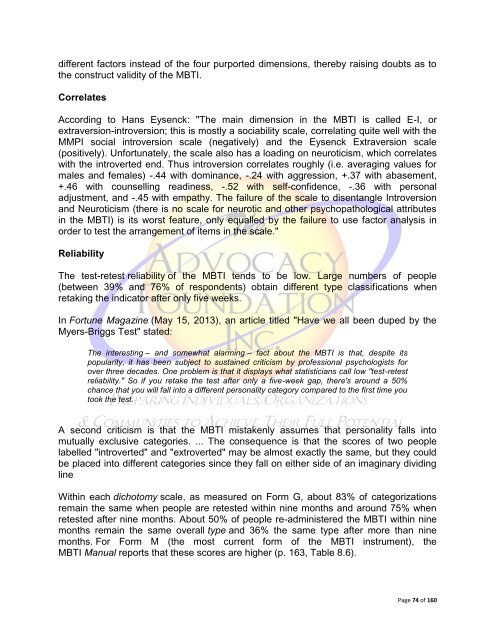The Gift of Introversion
The Gift of Introversion
The Gift of Introversion
Create successful ePaper yourself
Turn your PDF publications into a flip-book with our unique Google optimized e-Paper software.
different factors instead <strong>of</strong> the four purported dimensions, thereby raising doubts as to<br />
the construct validity <strong>of</strong> the MBTI.<br />
Correlates<br />
According to Hans Eysenck: "<strong>The</strong> main dimension in the MBTI is called E-I, or<br />
extraversion-introversion; this is mostly a sociability scale, correlating quite well with the<br />
MMPI social introversion scale (negatively) and the Eysenck Extraversion scale<br />
(positively). Unfortunately, the scale also has a loading on neuroticism, which correlates<br />
with the introverted end. Thus introversion correlates roughly (i.e. averaging values for<br />
males and females) -.44 with dominance, -.24 with aggression, +.37 with abasement,<br />
+.46 with counselling readiness, -.52 with self-confidence, -.36 with personal<br />
adjustment, and -.45 with empathy. <strong>The</strong> failure <strong>of</strong> the scale to disentangle <strong>Introversion</strong><br />
and Neuroticism (there is no scale for neurotic and other psychopathological attributes<br />
in the MBTI) is its worst feature, only equalled by the failure to use factor analysis in<br />
order to test the arrangement <strong>of</strong> items in the scale."<br />
Reliability<br />
<strong>The</strong> test-retest reliability <strong>of</strong> the MBTI tends to be low. Large numbers <strong>of</strong> people<br />
(between 39% and 76% <strong>of</strong> respondents) obtain different type classifications when<br />
retaking the indicator after only five weeks.<br />
In Fortune Magazine (May 15, 2013), an article titled "Have we all been duped by the<br />
Myers-Briggs Test" stated:<br />
<strong>The</strong> interesting – and somewhat alarming – fact about the MBTI is that, despite its<br />
popularity, it has been subject to sustained criticism by pr<strong>of</strong>essional psychologists for<br />
over three decades. One problem is that it displays what statisticians call low "test-retest<br />
reliability." So if you retake the test after only a five-week gap, there's around a 50%<br />
chance that you will fall into a different personality category compared to the first time you<br />
took the test.<br />
A second criticism is that the MBTI mistakenly assumes that personality falls into<br />
mutually exclusive categories. ... <strong>The</strong> consequence is that the scores <strong>of</strong> two people<br />
labelled "introverted" and "extroverted" may be almost exactly the same, but they could<br />
be placed into different categories since they fall on either side <strong>of</strong> an imaginary dividing<br />
line<br />
Within each dichotomy scale, as measured on Form G, about 83% <strong>of</strong> categorizations<br />
remain the same when people are retested within nine months and around 75% when<br />
retested after nine months. About 50% <strong>of</strong> people re-administered the MBTI within nine<br />
months remain the same overall type and 36% the same type after more than nine<br />
months. For Form M (the most current form <strong>of</strong> the MBTI instrument), the<br />
MBTI Manual reports that these scores are higher (p. 163, Table 8.6).<br />
Page 74 <strong>of</strong> 160

















